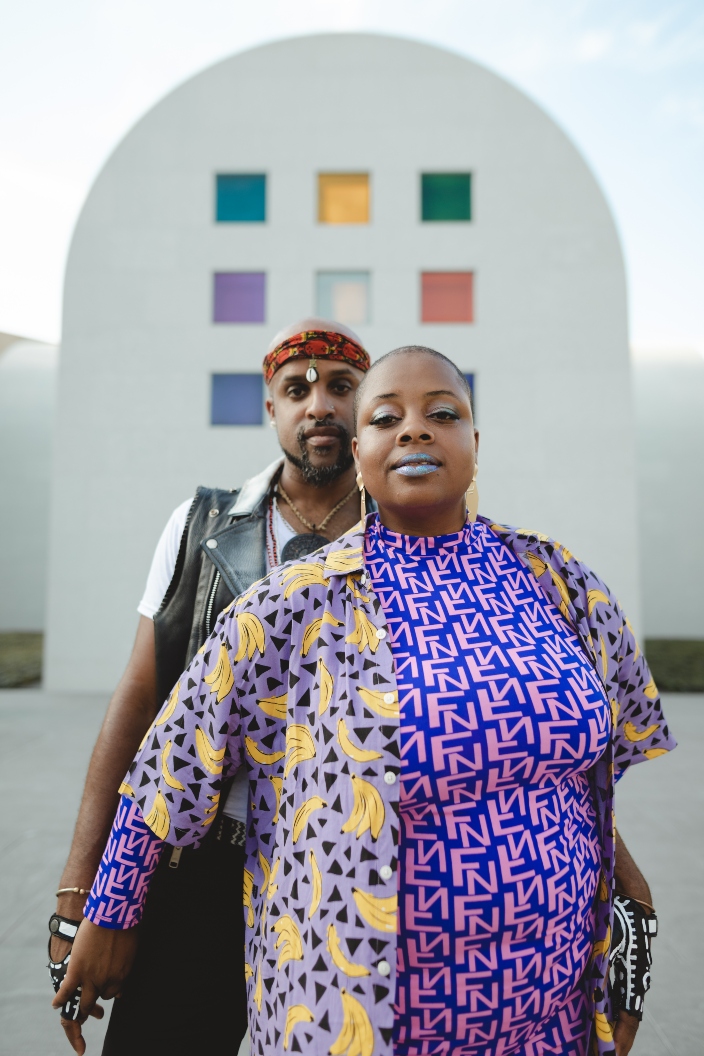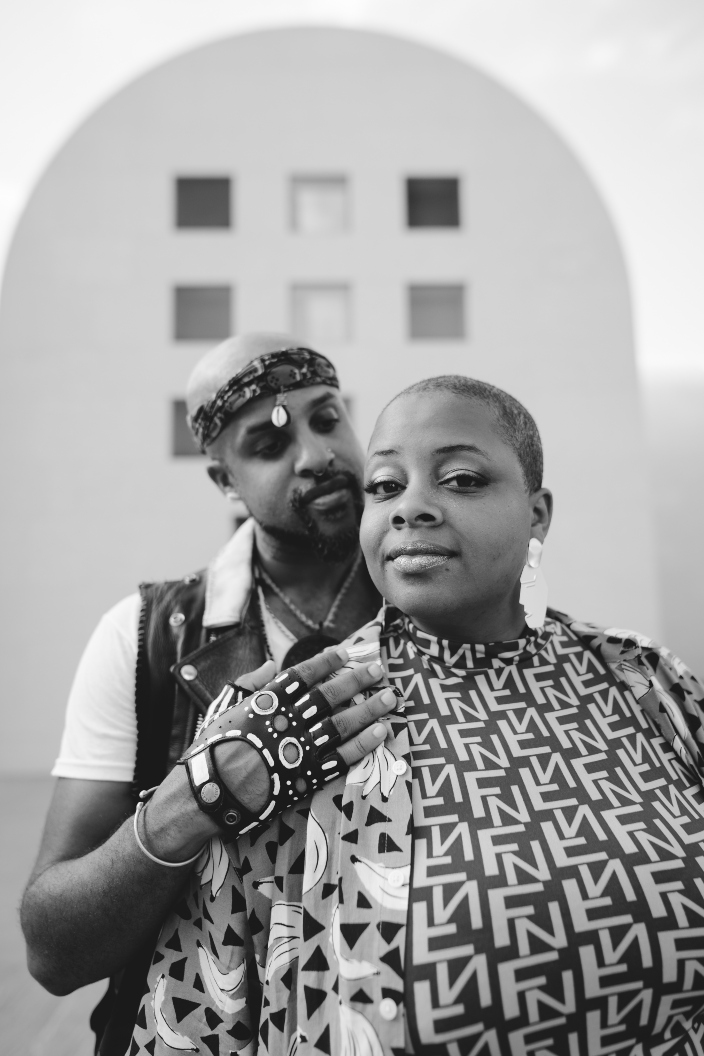Riders Against the Storm shake the foundations to keep hip hop alive in Austin.
By Aisling Ayers, Photos by Robert Hein
Faced with a music scene lacking an interest in their genre, Austin hip-hop duo and married couple Riders Against the Storm (RAS) made a space for themselves. Now three-time winners of Austin Music Awards’ Band of the Year, Ghislaine “Qi Dada” Jean and Jonathan “Chaka” Mahone plan to release their new album, Flowers for the Living, at the end of 2020.
RAS spoke with Austin Woman about the heritage of hip hop, their ten-year journey in Austin and celebrating the victories of Black women.
AW: What do you aspire to achieve with your music?
GJ: To help bring spiritual application to people’s everyday lives. To be in the same vein as the people who pioneered hip-hop music, who pioneered reggae and jazz music, is to reignite and evoke something that’s already inside of them and to be able to trust it so that they can birth new things all the time and feel fresh. A term that we get all the time is that our music is “refreshing.”
In hip hop early on some of the terminology was like “fresh,” ”fresh,” “fresh.” Because it was unrefined, it was pure, it was absolutely from the source. Not concerned about anyone’s gaze on it. It’s to encourage people to do their own thing.

AW: How does the theme of heritage influence your work?
JM: Hip hop is a big part of the heritage that we embrace and the power of it to inform, to inspire, to just empower. The people [who]were the originators of that, people [who]set up their turntables in the parks and plugged into the electricity of the light poles and just did it for their community so their community could have an outlet to escape the realities they were faced with, they created their own vortexes. The heritage that we pull from is definitely that, but also the heritage of community leaders.
Our name comes from a group called Sweet Honey in the Rock. They have a song called “Ella’s Song”…taken from a speech from Ella Baker. They talk about passing the torch to the young who will “run against the storm.” We chose Riders Against the Storm in the vein that we are the generation that follows those [who]made a tremendous commitment to freedom. To a lot of the ideas still unfulfilled here in America. They took a stand so that we could stand taller. Our mentors were community organizers. Most of them were women. Also African storytellers who embraced us as hip-hop artists but also taught us the power of stories [that]bring people together and the power of that gathering.
AW: What has it been like to develop your music and brand in Austin?
JM: There was some resistance to hip hop in general when we got here in terms of the venues and the booking. In the true form of hip hop, we didn’t depend on venues to determine our outcomes. We did a lot of performances in the community wherever we could. That’s how we really built our initial fanbase. From there, the venues and these folks [who]control who gets booked had to start paying attention to us. Because people were telling them about us.
Hip hop is the biggest genre in the world. But here in Austin, it plays third fiddle. Not [by]the city, but by the people who run the venues, the people that run the nonprofit organizations, the people in leadership. So, we didn’t back down from that. We just kind of kept pushing. Now we’re in a place in Austin where the…influence of hip hop, the influence of artists like Riders Against the Storm can’t be denied.
Being Leaders
We started a party called Body Rock ATX. When we first got here, we met DJ Chorizo Funk and started the Body Rock Party. We would come home with like $20 or $30 a night. But we knew we were building towards something. Now 10 years later, we’re still doing the party. Our last party in February had over 800 people. There’s really nothing like it in Austin. Our success didn’t have to do with venues understanding us. It had to do with our commitment to understanding the power of people coming together and celebrating. Expressing themselves. It’s a very inclusive space, where the queer community comes out, Black people, white people, Latinx folks. It’s just a really beautiful space for celebrating life.
We never changed our concept of who we are. That led to us winning Band of the Year three years in a row. Band of the Year’s never been won by a hip-hop band before, and it hasn’t been won after. That led to things like Blues on the Green. I hit up the organizers like, “How can the band of the year two years in a row now not be a part of this Austin institution?” We ended up being the first hip-hop band to play Blues on the Green. I feel that opened the door for what Jackie Venson has done this year in terms of demanding an all-POC Blues on the Green. Now the lineup is more diverse. Being leaders, saying, “You’re not going to undervalue or undermine what we’ve achieved,” is part of cracking that foundation.
AW: How does it affect you when people assume there’s not a hip-hop presence in Austin?
JM: If we were a rock band, there’d be a whole lot more people knocking on our door. We wouldn’t have to work as hard. But because it’s hip hop, there was a storm that we had to ride against. We just had to keep demanding and saying we’re here. It’s the same thing as “Black people aren’t here.” No, we’re here. You’re just ignoring us and making it hard for us to be here. We’re not getting acknowledged, we’re not getting resources, we’re not getting opportunities that allow us to stay here. So, that’s why we’re having to leave. But your lack of acknowledgement of us doesn’t mean we’re not here. We’re here.
There is a strong hip-hop community. A strong and growing R&B community here. From here forward, it’s going to be acknowledged worldwide and nationally, but we weren’t getting that same opportunity that other genres got automatically. Just because they played genres that this city had a bias towards.
AW: Tell me about “Black Girl Payday.” What inspired this song?
GJ: I wrote the song…based on a historical figure in the Haitian Revolution. The steps she took to acquire wealth, even as an enslaved woman. And the steps she took to matriculate out of that through some particular geniuses that she had. It’s really an homage to that aspect of the spirit. To be able to reconstruct whatever paradigm you’re given at birth.

It doesn’t have to be your ultimate. It does not have to be the one thing that defines you. Whatever you were born into, whatever construct, even if it’s more difficult for you than some others, you are very capable of morphing it to your desires and also to the empowerment and benefit at large of people. My grandmother is someone who always was like, “It doesn’t matter if your dress costs $7. You walk up to a room like it costs you $7,000 and that is how the room will address you.”
That is about that given birthright of black women, if we understand ourselves as the matriarch of the planet, and what [it]means to step into that. Obviously I’m doing it in a very fun way. I’m not necessarily doing it explicitly lyrically, but energetically. That’s what I’m seeking to exude and to have people catch wind of. Once they have that, they’re able to walk with it. It’s really wonderful. I’ve had white men be like, “That is an amazing song” because what I say when I perform it is, “You should be happy to see black women win.”

